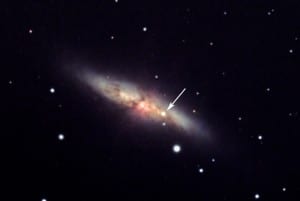Lunch Hour Lecture: On supernovae and serendipity
By ycrnf01, on 13 October 2014
Like a white dwarf, autumn 2014’s first Lunch Hour Lecture was dense, full of energy and tightly packed (but in this case, time and not space, I might add).
Psyched for my first Lunch Hour Lecture, I was ready to explore the world of supernovae with a 45-minute guided journey through the stars, namely, ones in the process of exploding very dramatically.
Radiating enthusiasm and demonstrating expertise from start to finish, Dr Steve Fossey (UCL Physics and Astronomy) took a capacity audience on a whistle stop tour of January’s discovery of a Type ia supernova, memorably named SN 2014J, and situated in our neighbourhood galaxy, the sci-fi sounding, Messier 82.
After summarising the rules for supernovae discovery (there are two options: looking, and not looking but accidentally finding), Dr Fossey gave a short overview of history’s accidental supernova discoveries.

One scenario for Type Ia supernovae: a white dwarf accreting matter from a neighbour until it becomes unstable
Credit: European Southern Observatory via Oli Usher
Beginning with Tycho Brahe’s find in 1572 – labelled SN 1572 – which rewrote the rules of astronomy, he moved on to Johannes Kepler’s discovery of SN 1604 in, wait for it, 1604 (are you seeing a pattern here?) and finally, and more recently, SN 1987A, found by astronomers in Chile.
 Close
Close


